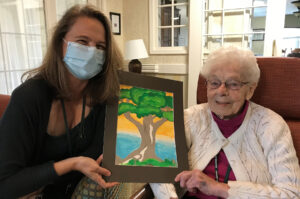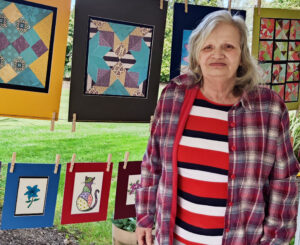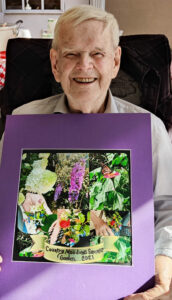“Did I do that?” asks Dottie as she looks at a painting of a tree. A resident of the Connections Memory Support Services Neighborhood at Country Meadows of West Shore in Mechanicsburg, she continues, “I do surprise myself. That’s unbelievable!”
Yes, she did paint the beautiful picture.

Genee Atwater, CTRS and resident Dottie admire Dottie’s painting of a tree which was displayed at the campus’ Art in the Garden annual art show.
“Art can be fun, and evidence shows it can have positive results for individuals living with dementia in multiple areas, specifically in the areas of connection and engagement,” says Genee Atwater, CTRS, Director of Dynamic Living -Country Meadows of West Shore.
Sometimes we all have difficulties finding the right words to express our emotions. Now imagine that feeling ten-fold and you begin to understand the frustrations experienced by people living with Alzheimer’s disease and dementia. Art can provide a vehicle to assist these residents to express themselves–sharing observations and concerns. At Country Meadows Retirement Communities, residents in the Connections Memory Support Programs often participate in a variety of creative endeavors.
As a Certified Therapeutic Recreation Therapist, Atwater uses fun and games, backed by science, to help strengthen residents’ cognitive abilities. She develops weekly schedules which include meaningful activities and projects to engage residents such as brain games, active tasks, purposeful service, creative corner and music makers. Every program is tailored specifically to help residents with dementia find an outlet for expression and enjoy life.
As part of the creative curriculum, Atwater presents various art projects from painting to collage to crafts. “These projects offer physical benefits including fine motor coordination as well as the cognitive benefits of decision making, choosing colors, tools and coming up with ideas. That’s all very useful for their cognition and self-esteem; they can do more than they realize,” she says.
This is very true for Dottie who says, “It makes me feel good that I can do this; it builds my confidence.”

A West Shore campus resident stands among the pieces on display at Art in the Garden at Country Meadows of West Shore in Mechanicsburg.
Multiple studies confirm positive effects for participants living with dementia who create art. One study observed an increase in spontaneous communication by participants. “Play is so important for neuroplasticity of the brain. We have learned that the brain continues to develop, it doesn’t stop,” Atwater explains. “I do art projects so they can have new and novel experiences. It helps to create new pathways in the brain.”
Residents work on many projects in addition to art. Another campus favorite is any activity that helps others. To help local animals in need, residents regularly gather to make dog toys and blankets to support
animal rescue. And as the holidays approach, group kitchens are abuzz with residents making cookies.

A resident at Country Meadows shows off his creation that was on display at the campus’ Art in the Garden event.
“They’re starting to bake cookies for soldiers and who knows how many pounds of cookies they will bake before [the holidays,]” says Atwater. “This is a lively place. These are vibrant, wonderful people and they have so much life in them. They love to help.”
Dottie agrees, saying, “I love to help people. That is my main thing.”
“When you are working on projects that help others, that changes your mood, doesn’t it?” asks Atwater of Dottie, adding that the resident is one of the campus’ best “encouragers.”
Earlier this month Atwater shared residents’ talents by hosting Art in the Garden—an annual art show that honors the creative work done by Connections Memory Support residents, demonstrating the people living with dementia can lead full lives. She came up with the event to provide a safe opportunity for residents to indirectly participate in the Alzheimer’s Association’s Walk to End Alzheimer’s®. “While I absolutely love the walk and applaud participants’ efforts, it’s not safe for our residents to attend,” says Atwater. “Our residents do beautiful art all year long, so I thought hosting an art exhibit is such a fantastic way to bring both the artists and the public together following our local walk.”
All the artwork is mounted, framed and hung on professional display units making the art show even more impactful. Atwater enjoys seeing residents recognize their individual masterpieces. “I have had residents literally go outside, see everything hanging, go directly over to the piece that they made and say, ‘I made that.’”
Speaking with Atwater, her compassion for working with individuals living with Alzheimer’s disease and related dementia is obvious. “There are really difficult things about dementia, and we have some residents who really struggle with anxieties and behaviors, but that doesn’t mean that they are not enjoying themselves and not participating in things,” she says. “There is so much that they are still doing and still part of and we celebrate every small victory.”
Her decision to work in the field of dementia is personal. “Two of my grandparents had dementia. I chose to work in this field as that’s where my heart was. I look at dementia through the lens of both a practitioner and a family member.”
As Dottie continues to look at her painting of a tree, she notices areas of interest on the tree trunk and questions why she painted parts of the trunk a white color. She concludes, “I bet I thought that part was old and rotten so I painted it white.”
Atwater responds, “It adds more interest to the tree trunk, doesn’t it? Otherwise, it would be all brown and boring. But look, even though the tree is getting old, look how vibrant and interesting it is!”
Dottie smiles knowingly and says, “Yes, I guess I let my imagination work overtime.”
Atwater is thrilled with this validation for the art program and says, “Nothing about life is perfect, much less living with dementia. Let it happen. Watch it unfold. Art is a beautiful space for free expression. I’ve learned things I couldn’t have learned any other way.”
NOTE: According to the Alzheimer’s Association, art projects can create a sense of accomplishment and purpose. They can provide the person with dementia — as well as caregivers — an opportunity for self-expression. Click here for more information to work on art projects with your loved one with dementia. https://www.alz.org/help-support/caregiving/daily-care/art-music
